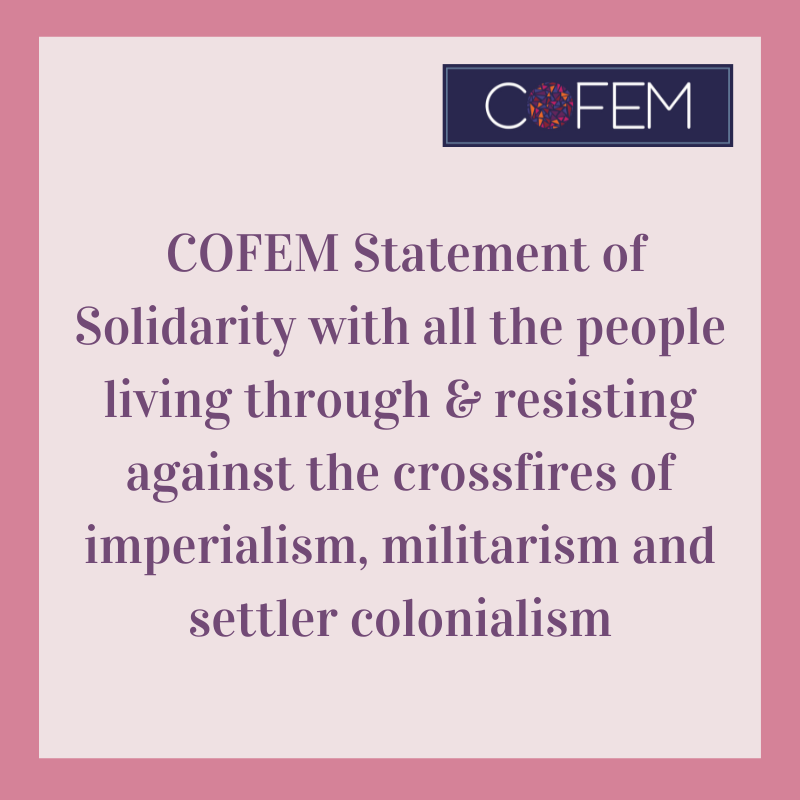In the face of the overwhelming challenges that echo across the world, The Coalition of Feminists for Social Change (COFEM) extends our unwavering solidarity with those in the crossfires of imperialism, militarism and settler colonialism.
Our hearts are heavy with the recognition that human suffering extends far beyond the borders of the latest headlines. While the world’s gaze remains fixed on the devastating genocide in Gaza, it is also our duty to remain vigilant and acknowledge the pain and struggles of those in regions less geopolitically relevant to some, but no less significant to us.
Navigating the waves of news that share tales of suffering from around the world can often leave us feeling powerless. The term “polycrisis” instills a sense of panic and malaise, a feeling that can overwhelm our senses. Western media and those in positions of power monopolize disaster-centric language, leaving people with a sense of helplessness – particularly those of us in the Global South. While these instances of violence are, indeed, disasters, labeling them as crises almost freezes the devastations in time, as if they are sporadic occurrences and do not have long-term consequences across generations. In reality, they are the calculated results of well thought-out imperialist strategies that continue to disenfranchise the many, while benefiting the few.
Our compassion and empathy for these situations should mirror the nature in which we come to witness these atrocities: in a slow and sustainable way that centers our humanity and recognizes the inextricable links among us all. It is essential to resist the urge to be overwhelmed and instead approach these issues with deliberate and sustained focus, understanding that addressing the root causes of inequality requires a commitment to dismantling global systems of oppression and promoting justice for all.
In Sudan, the echoes of a historical genocide in Darfur persist amid the complex aftermath of the 2019 uprising and subsequent military coup, leading to a protracted and challenging transition to civilian rule. The Sudanese capital has once again become a stage for conflict, resulting in the displacement of millions of people and contributing to the largest child displacement crisis, as reported by UNICEF. The 2019 uprising, fueled by a yearning for democratic governance, marked a pivotal moment in Sudan’s history. However, the subsequent military coup and prolonged transition to civilian rule have created an intricate web of challenges, further exacerbating Sudan’s humanitarian crisis. As advocates for justice at COFEM, we stand in unwavering solidarity with the resilient people of Sudan, recognizing the profound historical context that intensifies the urgency for change to break this tragic cycle. Please join us in urging the international community to amplify efforts for diplomatic solutions, feminist funding, humanitarian aid, and sustainable peace-building initiatives in Sudan.
In Pakistan, the forced expulsion of over 1 million Afghan refugees echoes the painful historical patterns of displacement. People now find themselves confined to makeshift tent camps, grappling with dire living conditions and uncertainty, as the international community appears to have turned its back on their plight. The lack of global attention exacerbates their challenges, leaving people in a state of limbo. To make a tangible impact, we urge you to raise awareness about the plight of Afghan refugees in Pakistan. Share their stories, engage with advocacy groups, and call on policymakers to prioritize the needs of displaced Afghanis. Afghan women and girls are at particular risk, both in Pakistan and in Afghanistan.
The Nagorno-Karabakh region’s turmoil, marked by forced displacement and ethnic cleansing, draws parallels to historical conflicts. We stand firm in our support of the Afghan and Armenian population facing these injustices, urging the international community to address this crisis with the urgency it deserves and learning from historical lessons.
In the face of the ongoing crisis in the eastern Democratic Republic of Congo (DRC), where violence continues to displace millions and subject thousands of women to unimaginable suffering, it is crucial to raise our voices for change. Join us in urging the Biden administration to prioritize humanitarian efforts and suspend deportations to the DRC. We need to make a collective stand for compassion and justice. Be informed about what is taking place in DRC, engage with advocacy groups, and reach out to policymakers to ensure that the plight of those fleeing violence is met with a humane and empathetic response. Together, we can make a difference.
These are not isolated crises; they are interconnected threads of a larger tapestry of human suffering, woven with historical complexities. We know it is disheartening that power brokers often prioritize strategic interests over the collective well-being of our humanity. However, it does not have to be this way. We do not have to turn our eyes away.
COFEM stands firm in our transnational solidarity that embraces the inherent dignity and rights of every individual. We call upon all advocates for justice to join us in amplifying the voices of the marginalized, challenging the status quo, centering women and girls in crisis responses, and fostering a world where our commitment to peace and justice knows no bounds.
Together, let us build a future where solidarity triumphs over indifference and where the struggles of brown and black people are acknowledged and addressed with the urgency we deserve.
